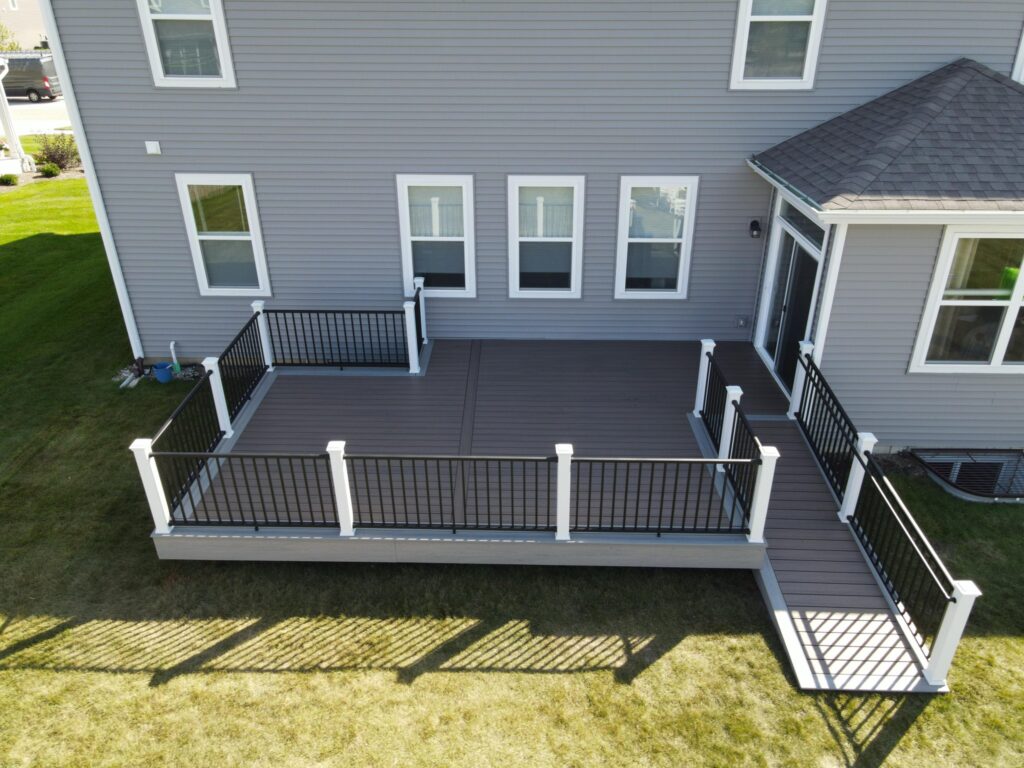Why it's smart to work with qualified Trex Deck Builders Near Me
Why it's smart to work with qualified Trex Deck Builders Near Me
Blog Article
Discovering Various Types and Benefits of Deck: A Comprehensive Guide
The exterior deck is greater than just an expansion of one's living room; it's a testimony to individual style, a location for celebrations, and a sanctuary to loosen up. The option of decking product dramatically affects these elements, with options ranging from the timeless attraction of timber to the practicality of composite, and the durability of aluminum. Comprehending the subtleties of these materials is vital, so let's start our expedition, one deck kind at once.
Recognizing the Basics of Decking Material
Decking material offers as the foundation of any kind of deck project, dictating the overall visual appeals, toughness, and performance of the final product. The marketplace uses a substantial range of materials, each with distinct attributes matched to various design choices and environmental problems. The option includes all-natural timber, composite, plastic, aluminium, and also concrete. Timber, being the typical selection, offers an ageless, traditional allure. Compound, a mix of wood and plastic, offers wood-like aesthetics with much less upkeep. Plastic and aluminium give modern-day, minimalistic alternatives, while concrete is favored for its unmatched sturdiness. The option of material substantially influences the deck's lifespan, upkeep needs, and resistance to components. Understanding the essentials of decking material is crucial for a successful deck job.
Advantages and Drawbacks of Wood Decks
In examining deck types, understanding the benefits and drawbacks of timber decks comes to be vital. This involves thinking about factors such as the sort of wood selected and its influence on the deck's performance. The subsequent conversation will explore these factors carefully to supply an extensive sight of the disadvantages and benefits connected with wood decks.

Timber Deck: Pros & Disadvantages
The beauty of timber decks can not be overemphasized. They emanate a timeless charm and warm aesthetic that lots of property owners find tempting. This all-natural material is versatile, enabling for a variety of style possibilities, and can supply an exceptional roi.
However, wood decks also come with specific disadvantages. Its durability can be much less than various other decking materials, especially if not effectively cared for.
Selecting Your Timber Type

Discovering the Advantages of Composite Decking
Turning attention to composite decking, it supplies one-of-a-kind advantages. Its longevity exceeds conventional timber in rough weather condition conditions, lowering the requirement for regular upkeep. It gives a pleasing aesthetic charm with variable layout choices.
Composite Decking Longevity Benefits
In spite of the huge selection of decking alternatives readily available in the market, composite outdoor decking stands out for its toughness. This kind of decking, made from a blend of timber and plastic, supplies a resilient, lasting platform immune to components that normally weaken various other materials. In summary, the sturdiness benefits see this page of composite decking supply a lasting, cost-efficient option for outside living areas.
Maintenance of Composite Decks
In enhancement to resilience, composite decking boasts a significant benefit in terms of upkeep. Unlike standard wood decks, composite decks are not at risk to rot, warp, or insect damages, hence dramatically lowering the requirement for routine repairs and replacements. The low-maintenance nature of composite decks not only offers convenience of upkeep however additionally adds to their long-lasting cost-effectiveness.
Aesthetic Appeal and Variability

The Rising Popularity of Aluminum Decks: Why Select Them?
As the demand for low-maintenance and resilient outdoor decking rises, light weight aluminum decks are increasingly coming to be the go-to choice for several house owners and contractors. These decks, made from a light-weight yet sturdy steel, offer several benefits over standard wood or composite decks. To start, light weight aluminum is normally resistant to the components, suggesting it will not warp, split, or discolor in time. This makes it an economical choice in the future. Furthermore, its non-porous surface area my sources avoids the growth of fungis, bugs, or mold and mildews, ensuring a healthy and clean outdoor area. Aluminum decks are additionally eco-friendly, as they are commonly made from recycled products and can be recycled again at the end of their life-span. Their contemporary and smooth visual appeal fits well into contemporary home designs.
Upkeep Tips for Different Decking Materials
All-natural wood decks need normal sealing or staining to avoid climate damage, while composite decks require regular cleaning with soap and water to remove discolorations and debris. Comprehending these maintenance requires is critical for deck proprietors to maximize their investment and maintain their decks looking their best for years to come.
Variables to Take Into Consideration When Picking Your Deck Type
Composite decks resist moisture well, making them excellent for stormy or damp regions. While some might want a glamorous, unique timber deck, spending plan restrictions may necessitate an extra cost-effective option like pressure-treated timber. Thus, climate, price, upkeep, and lifestyle are vital factors to consider in deck option.
Conclusion
Wood decks enchant with all-natural appeal, while composite and aluminum selections supply sturdiness and reduced maintenance. Before committing to a certain deck kind, homeowners must very carefully take into consideration the benefits, disadvantages, and upkeep requirements of each product.
In evaluating deck types, recognizing the pros and disadvantages of wood decks becomes essential.In spite of the wide variety of outdoor decking choices offered in the market, composite outdoor decking stands out for its sturdiness. Unlike standard timber decks, composite decks are not susceptible to rot, warp, or insect damages, hence considerably reducing the need for normal repair work and replacements. These decks, made from a lightweight yet sturdy metal, offer a number of advantages over standard timber or composite decks. All-natural timber decks call for normal securing or discoloring to prevent climate damages, while composite decks need routine cleaning with soap and water to eliminate spots and debris.
Report this page